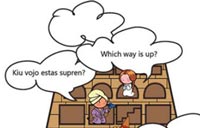Chinglish goes viral
Updated: 2014-05-29 09:37
(CRI)
|
|||||||||||
|
|
Chinglish was originally seen as a problem in China after the country was selected to host the 2008 Olympics. Chinese officials made a big leap to correct public signs that used Chinglish. During the last 10 years the standards of English in China have increased dramatically and Chinese citizens now feel comfortable with using Chinglish terms and understand the humor behind them.
Zhang Meilan discussed the history of Chinglish.
At first, Chinglish was not only found in Guangzhou. Originally Chinglish was also not a pure mix of English and Chinese. Chinglish started off as a mixture of Portuguese and Chinese. After Shanghai was established as the economic and financial center for China, Shanghai also became a major port of Chinglish. As China became more open,Chinglish started rise in popularity in other parts of China. Chinglish can often be heard at the Huiming Street in Xi'an and at the Silk Market in Beijing.
I caught up with several foreign students in Beijing to hear some of the Chinglish they have witnessed during their time here.
"A chinglish phrase I have heard before is good good study, day day up. The harder you study more you can improve your English. Just the fact that it makes no grammatical sense is really funny. "
"Dangerous road kids caring, I guess it means be careful of the kids on the street."
"It makes sense, but it is an unusual way of expressing that thing. Like don't step on the grass, tiny grass is sleeping. I think it means that the grass was just planted."
Chinglish is an ever growing phenomenon and in the future their may be a people mountain people sea of foreigners using hop Chinese/English expressions.
Related: To gives best example of 'no zuo no die'
Related Stories
West turns new page in thinking on Chinese literature 2013-08-03 07:35
New novel sparks interest in dialect literature 2013-06-12 10:29
Mo Yan promotes Chinese literature 2013-05-22 09:59
Haven of Literature 2013-05-20 09:38
Qingming in literature 2013-03-20 15:53
Today's Top News
Russia bans 'historically false' WWII movie
Egypt extends presidential vote
'Homemade electricity' creates buzz
UK debates on its EU membership
Fighting kills 40 in east Ukraine
Britain encourages students to work in China
Ukraine to pay gas debt to Russia
Parties stunned by EP election results
Hot Topics
Lunar probe , China growth forecasts, Emission rules get tougher, China seen through 'colored lens', International board,
Editor's Picks

|

|

|

|

|

|








